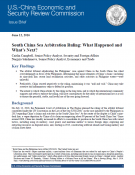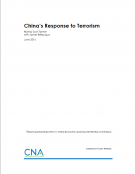Research
Research

On July 12, 2016, the arbitral tribunal adjudicating the Philippines’ case against China in the South China Sea ruled overwhelmingly in favor of the Philippines, determining that major elements of China’s claim—including its nine-dash line, recent land reclamation activities, and other activities in Philippine waters—were unlawful. Predictably, China reacted negatively to the ruling, maintaining it was “null and void.” China may take assertive and inflammatory steps to defend its position. The extent to which China abides by the ruling in the long term, and to which the international community supports and seeks to enforce the ruling, will have consequences for the utility of international law as a tool to ensure the peaceful, stable, and lawful use of the seas going forward.
Research

The report, prepared for the Commission by Murray Scot Tanner and James Bellacqua at CNA, examines the Chinese government’s efforts to combat terrorism by analyzing China’s definition and perception of its terrorist threat, its institutional infrastructure, strategy, and policies for combating terrorism, international counterterrorism cooperation efforts, and the opportunities for, and challenges of, U.S.-China cooperation on countering terrorism.
Research

China’s ability to conduct conventional cruise and ballistic missile strikes on Guam is growing, even as the island’s strategic importance to the United States is increasing. This report examines the reasons behind China’s development of new conventional weapons that can reach Guam, the array of forces it could employ against Guam in a potential conflict, and policy options for the United States to consider in response. Accuracy limitations and platform vulnerabilities render the current risk to U.S. forces on Guam in a potential conflict relatively low, but China’s commitment to continuing to modernize its strike capabilities indicates the risk will likely continue to grow going forward.

